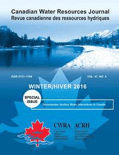
Canadian Water Resources Journal
Scope & Guideline
Unveiling critical insights in hydrology and policy.
Introduction
Aims and Scopes
- Hydrological Research and Modeling:
The journal emphasizes research on hydrological processes, including modeling of streamflow, water temperature, and hydrological budgets, particularly in the context of climate change impacts. - Water Quality Assessment:
A significant focus on the assessment of water quality in various ecosystems, including lakes, rivers, and wetlands, and the impacts of both natural and anthropogenic factors on these water bodies. - Water Governance and Policy:
The journal explores the intersections of water governance, policy-making, and regulatory frameworks, emphasizing the need for effective management practices and adaptation strategies in response to changing water dynamics. - Ecological Impacts and Management Practices:
Research on the ecological impacts of water management practices, including agricultural drainage and urban stormwater management, is a core area, highlighting the balance between human activities and ecosystem health. - Climate Change Effects:
The examination of climate change effects on water resources, including temperature changes, precipitation patterns, and extreme weather events, is a critical focus, addressing the need for adaptive management strategies.
Trending and Emerging
- Climate Resilience and Adaptation:
Research focusing on the impacts of climate change on water resources and the development of adaptive management strategies has increased, highlighting the urgent need to address climate-related challenges. - Integrated Water Resource Management (IWRM):
There is a rising trend towards studies that promote integrated approaches to water management, considering the interconnections between surface water, groundwater, and ecosystem health. - Impact of Urbanization on Water Systems:
Studies examining the effects of urbanization on hydrological processes and water quality, particularly in the context of stormwater management and urban planning, are gaining traction. - Technological Advancements in Water Monitoring:
The integration of new technologies, such as remote sensing, LiDAR, and statistical modeling techniques, for water monitoring and management is increasingly prominent in recent publications. - Policy Analysis and Governance Frameworks:
There is a growing interest in analyzing water governance frameworks and policies, particularly in relation to conservation authorities and regulatory reforms, reflecting the dynamic nature of water management in Canada.
Declining or Waning
- Historical Water Use Analysis:
Research focused on historical water use patterns and sectoral withdrawals has decreased, perhaps due to a shift towards real-time monitoring and management practices that emphasize current water use dynamics. - Paleo-hydrology Studies:
Paleo-hydrology and historical reconstructions of streamflow have seen less frequent publication, indicating a potential move towards more contemporary studies that address current and future water resource challenges. - Traditional Flood Frequency Analysis:
Traditional methodologies for flood frequency analysis, such as annual maximum series approaches, appear to be declining as new statistical techniques and modeling approaches gain favor in the field. - Groundwater Studies:
While groundwater remains an essential topic, studies specifically focused on its historical analysis or less significant aquifer systems may be waning as attention shifts to integrated water resource management. - Water Quality Impairment Assessments:
Assessments of water quality impairments that do not integrate broader ecological or economic contexts may be declining, as there is a growing emphasis on holistic and interdisciplinary approaches.
Similar Journals

Water Conservation Science and Engineering
Advancing Sustainable Solutions for Water PreservationWater Conservation Science and Engineering, published by SPRINGERNATURE, is a vital academic journal dedicated to advancing the fields of environmental engineering, ocean engineering, waste management, and water science and technology. Since its inception in 2016, the journal has quickly established itself within the academic community, achieving a commendable Q3 ranking across multiple categories in 2023. With an ISSN of 2366-3340 and an E-ISSN of 2364-5687, it is accessible to a global readership eager to explore the latest research and innovations in water conservation and sustainable practices. Although currently not open access, the journal is committed to publishing high-quality scholarly articles that provide insights into effective water management strategies, innovative engineering solutions, and the critical importance of preserving our water resources. Based in Singapore, Water Conservation Science and Engineering aims to foster interdisciplinary collaboration among researchers, professionals, and students, making it an essential resource for anyone passionate about environmental sustainability and preservation.

Water Resources
Advancing sustainable solutions for our most vital resource.Water Resources, a prominent journal published by MAIK NAUKA/INTERPERIODICA/SPRINGER, focuses on the critical and evolving field of water science and technology. Established in 1976 and with a long-standing commitment to advancing knowledge, this journal explores interdisciplinary research that addresses the challenges surrounding water resource management, quality, and sustainability. With an impact factor positioned within the Q3 category of its field, it holds a notable Scopus rank (#181/261) in Environmental Science, emphasizing its role in driving scholarly discourse. While currently not open access, Water Resources provides vital insights for researchers, professionals, and students, making it an essential resource for those seeking to innovate and implement effective water management solutions. To stay ahead in a domain that is increasingly paramount to global sustainability efforts, consider engaging with the latest research published in this vital journal.

Journal of Hydrology X
Transforming Knowledge into Action for Global Water ManagementJournal of Hydrology X, a premier publication in the field of water science and technology, is published by ELSEVIER from the Netherlands. Since transitioning to Open Access in 2018, this journal has provided researchers, professionals, and students unrestricted access to vital research findings and advancements in hydrology. With an impressive Q1 category ranking in 2023, and a Scopus ranking of #41 out of 261 in Environmental Science, it stands at the forefront of water-related studies, showcasing high-quality, peer-reviewed articles that drive innovation and collaboration. The journal focuses on integrative approaches from 2019 to 2024, catering to a diverse audience eager to advance the understanding and management of freshwater resources globally. Its commitment to disseminating impactful research makes it an essential resource for anyone working in or studying this vital field.
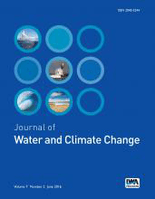
Journal of Water and Climate Change
Empowering Sustainable Solutions for a Changing ClimateJournal of Water and Climate Change is a premier open-access journal published by IWA Publishing, dedicated to advancing the understanding of the interplay between water resources and climate change. With an ISSN of 2040-2244 and an E-ISSN of 2408-9354, this journal has established itself as a crucial platform for interdisciplinary research, publishing high-quality articles that address the challenges posed by climate variability on water systems globally. Since achieving open access status in 2021, the journal has fostered wider dissemination of knowledge among its audience, featuring works that span pivotal topics in Atmospheric Science, Global and Planetary Change, and Water Management. Notably ranked within the top quartiles in several relevant categories as of 2023, it occupies a vital position in the academic community, offering insights that are essential for policymakers, environmental scientists, and researchers striving to create sustainable solutions for water and climate challenges. Its commitment to excellence is reflected in its strong Scopus rankings, standing at the 66th percentile in Water Science and Technology and 65th percentile in Management, Monitoring, Policy, and Law. Located in the United Kingdom, this journal not only serves as a repository of cutting-edge research from 2010 to 2024 but also engages a diverse readership passionate about promoting sustainable water management practices.
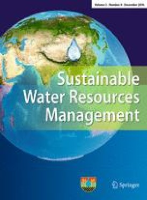
Sustainable Water Resources Management
Empowering interdisciplinary dialogue on water sustainability.Sustainable Water Resources Management is an esteemed journal focusing on the critical field of water resource management in the context of sustainability. Published by Springer International Publishing AG, this journal serves as a vital platform for researchers, policymakers, and practitioners to disseminate cutting-edge research and innovative practices aimed at addressing global water challenges. With an impressive impact factor aligned with its Q2 ranking in Water Science and Technology and Q3 in Renewable Energy, Sustainability, and the Environment, it maintains a robust reputation in its field, evidenced by its Scopus rankings. Covering a diverse range of topics from integrated water resource management to the nexus between water and energy, Sustainable Water Resources Management is committed to fostering knowledge exchange and encouraging interdisciplinary dialogue among its audience. This journal, operating under strict academic rigor, plays an essential role in advancing sustainable practices and is open from 2015 to 2024, making it a relevant resource in today’s rapidly evolving environmental context.

Carpathian Journal of Earth and Environmental Sciences
Pioneering Research at the Intersection of Earth and EnvironmentCarpathian Journal of Earth and Environmental Sciences is a distinguished academic journal dedicated to advancing the interdisciplinary field of Earth and environmental sciences. Published by the Carpathian Association for Environment and Earth Sciences, this journal plays a pivotal role in disseminating high-quality research focused on the dynamic interactions between geological processes and environmental changes. With an ISSN of 1842-4090 and an E-ISSN of 1844-489X, the journal is indexed in Scopus and holds an esteemed Q3 quartile ranking in both Earth and Planetary Sciences and Environmental Science categories as of 2023. Since its inception in 2008, the Carpathian Journal has provided an open access platform for researchers, professionals, and students to share insights, foster collaboration, and engage in critical discussions on pressing environmental issues. By continuously contributing to the body of knowledge in this field, the journal not only enhances academic discourse but also promotes sustainable environmental practices across Romania and beyond.

Journal of Hydrology-Regional Studies
Shaping the future of water science through collaboration.Journal of Hydrology-Regional Studies, published by ELSEVIER in the Netherlands, stands as a leading open-access platform since 2014 for disseminating high-quality research in the fields of hydrology and water management. With an impressive impact factor and recognition as a Q1 journal in both Earth and Planetary Sciences and Water Science and Technology categories, it emphasizes regional studies that advance understanding of hydrological processes and their implications for sustainable management practices. The journal has established a significant global reach, evident from its Scopus rankings, which place it in the top percentiles within its disciplines, fostering a dynamic exchange of ideas among researchers, professionals, and students alike. By mobilizing critical insights and innovative solutions in hydrology, this journal aims to contribute to solving the pressing water-related challenges faced by our society.
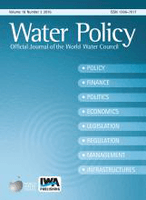
Water Policy
Fostering impactful discussions on water governance.Water Policy is a leading academic journal published by IWA PUBLISHING, dedicated to advancing the understanding of water management and policy across various disciplines. With a focus on the intricacies of water governance, the journal fosters dialogue among researchers and practitioners by presenting innovative studies and comprehensive analyses. Since transitioning to an Open Access model in 2021, it has increased accessibility to critical research, allowing for a broader reach and greater impact within the water sector. The journal's reputation is underscored by its classification in Q2 and Q3 quartiles in fields such as Geography, Planning and Development, as well as Environmental Science disciplines, marking it as a valuable resource for scholars and policymakers alike. The ISSN 1366-7017 and E-ISSN 1996-9759 facilitate streamlined access to its extensive archive, encouraging wider engagement in pivotal discussions surrounding sustainable water practices. With a commitment to shaping the future of water governance, Water Policy stands as an essential platform for sharing vital research and perspectives that contribute to effective water management globally.

Journal of Applied Water Engineering and Research
Integrating Technology for Effective Water ManagementJournal of Applied Water Engineering and Research is a dynamic platform dedicated to the advancement of knowledge in the field of water science and technology. Published by Taylor & Francis Ltd, this journal aims to bridge the gap between theoretical research and practical applications in water engineering, providing a crucial resource for researchers, practitioners, and policymakers. With an ISSN of 2324-9676 and an impressive ranking in the Q3 category for Water Science and Technology, it occupies a distinctive position within the scholarly community. The journal covers a wide spectrum of topics, including innovative water management strategies, sustainable practices, and the integration of technology in water resource management, thus contributing significantly to the discourse surrounding environmental sustainability. With publication years converging from 2013 to 2024, the Journal of Applied Water Engineering and Research continues to foster impactful research, enhancing our understanding and management of vital water resources.
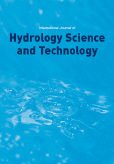
International Journal of Hydrology Science and Technology
Bridging Theory and Practice in Environmental EngineeringThe International Journal of Hydrology Science and Technology, published by InderScience Enterprises Ltd, is a distinguished platform dedicated to advancing knowledge in the field of hydrology, environmental engineering, and water science. With an ISSN of 2042-7808 and an E-ISSN of 2042-7816, this journal, established in 2011 and continuing through 2024, serves as an essential resource for researchers, professionals, and students alike. Despite being categorized in the Q3 quartile across multiple disciplines including Earth and Planetary Sciences, Environmental Engineering, Waste Management and Disposal, and Water Science and Technology, the journal maintains a reputation for contributing significant findings that impact both theory and practical applications in addressing hydrological challenges. Currently unavailable through Open Access options, the journal remains committed to disseminating valuable research that informs sustainable practices in water resource management. The editorial team encourages submissions that explore innovative strategies and methodologies while fostering interdisciplinary discussions, making this journal a pivotal player in shaping the future of hydrological science.